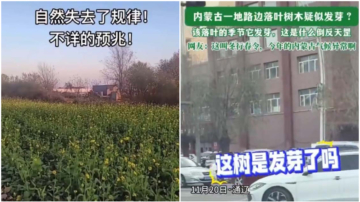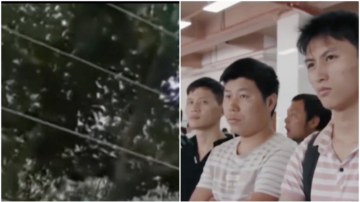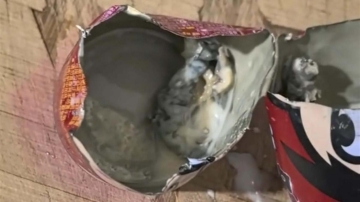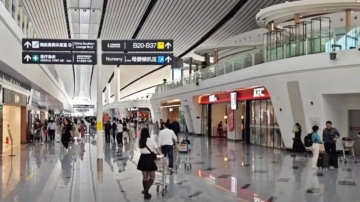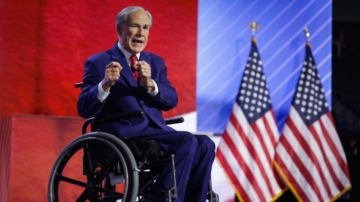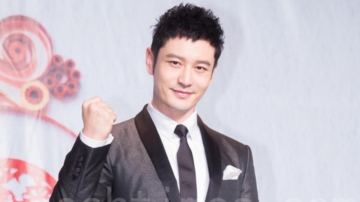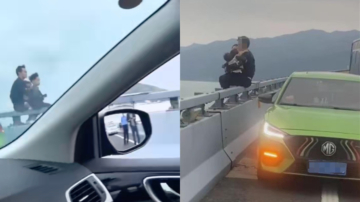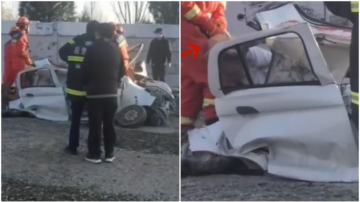【新唐人2012年6月20日訊】全球第一本「艾未未傳」在香港出爐。書名為《艾神》,書中「講述一個藝術家,一個公民,一個人,與他的同胞攜手,跟這顆星球上的一個超級強權所作的史詩性的殊死戰爭。」作者說艾未未所做的事情,似乎就是為了幫自己以及其他個體生命,向中共追索屬於自己的生命尊嚴。作者希望通過這本書表達對戰士艾未未的敬意和聲援。
《艾神》這本書的作者是《紐約時報》簽約攝影師杜斌。
他在書中勾勒了艾未未的成長歷程:艾未未從小跟隨父母在流放之地,做放羊娃﹔回到北京之後在「星星畫會」找到了心靈樂園,政治烏雲卻開始聚集﹔不惜從北京電影學院退學出國尋找自由的艾未未,在國外厭倦規矩的學校生活後,天馬行空,跟三教九流做朋友,參加各種示威遊行﹔父親病重艾未未被迫回到國內,以幫人設計建築方案維生﹔參與「鳥巢」設計,卻突然發現中共拿奧運來粉飾獨裁,因此拒絕出席奧運,還對外媒發表意見﹔之後發現互聯網王國,於是開始關注中國社會上各種不平的事,包括「楊佳」、「汶川大地震」,而成為維權精神領袖,令中共如坐針氈,忍無可忍,終於把艾未未緝拿,關押九九八十一天。
「艾神」是網友對艾未未的尊稱和暱稱,大意是「他就像一個守護神一樣,為需要說話的人去說話。」
杜斌說,一位廣受世人尊敬的藝術家,為何要「為人而戰」?究竟是甚麼原因而招致一個窮途末路的政權要動用所有的國家機器來顛覆和抹黑他?杜斌斷定,艾未未惹中共不開心的理由只有一個:人。他對人的生命的敬畏。
杜斌:「艾未未和中共之間的矛盾,就是人的矛盾,這就是實質。就是艾未未的眼裡有人,中共的眼裡沒有人。」
杜斌說,共產黨有槍、有炮、有金錢、監獄、坦克戰車、原子彈,有毀滅世間萬物的超級能力,但共產黨的眼裡從來沒有人。
艾未未做了一個人應該做的。只為告訴共產黨一句話:我們是人,不是牲畜!書中引述了艾未未說的一句話:「我們是人類之中最累的,因為我們還必須證明我們是人。」
杜斌說,艾未未作為一個藝術家,他把他的藝術,溶入中國社會的變革之中。這點是很少藝術家做的事情。
杜斌:「他身上讓人最珍貴的是,與強權的抗爭,用他非常藝術的方式,非常柔軟,非常有技巧的方式,來與一個強權做抗爭,我覺得這一點是最珍貴的。因為藝術往往是人的智慧的結晶,往往是其他人想不到的一種方式,但是他用這種方式來干預社會的一些事情。」
杜斌說,艾未未做的事情都是很小的事情。而這種很小的事情,往往就能碰觸到作為一個完整的人內心最柔軟的地方。
杜斌:「最讓我感動的是,在汶川地震,他收集了這麼多孩子的名字,他後來用了八千接近九千個孩子用的書包,做了一個展覽。那個作品我覺得它太直觀了,用這麼多的書包,每個書包就像一個孩子一樣,每個孩子都不在這個世界了。」
艾未未父親艾青曾被共產黨流放二十年,曾被指派做清掃糞便的工作。
杜斌說,作為兒子的艾未未今天還在繼續這份事業。曾經有網友對艾未未能夠出國卻堅守國內戰鬥表示敬意,艾未未回答說,「我是蛆」。杜斌的書中多次用「糞便政權」指代中共。
杜斌:「 它(中共)不是跟糞便一樣骯髒,它應該是比糞便還骯髒。看看發生在艾青身上的事情,看看發生在艾未未身上的事情。現在他做的工作,比他父親做的還要到位,他打入內部,他不是說了嗎?『我是蛆』。」
杜斌說,艾未未眼裡「有人」和中共眼裡「無人」的戰爭,是一場代表著數以億計的中國人,與中共你死我活的戰爭。只要中共存在一天,這場戰爭永不會停歇。
採訪編輯/秦雪 後製/君卓
“Deity Ai”: World's First Biography About Ai Weiwei
“Deity Ai”, the world's first biography book about Ai Weiwei
is due to be released on June 20th in Hong Kong.
The book tells the story of “an artist, a citizen, a person who
acts together with his compatriots to fight a life-or-death war against a superpower on this planet.”
It seems that all Ai Weiwei has done is to help himself and
other people to get recourse to their life dignity from the Chinese Communist Party (CCP), according to the author.
And the book is intended to express support and tribute to
warrior Ai Weiwei, says the author.
The book “Deity Ai” was authored by Du Bin, contract
photographer of the New York Times.
In this book, Du Bin outlines how Ai Weiwei grew up.
Ai spent his childhood in herding goats while living with his
parents in exile on the countryside.
After returning to Beijing, he found his spiritual paradise in
joining the Stars Painting Society, however, negative forces were gathering;
Later, Ai quit the Beijing Film Academy and went abroad to
seek freedom.
Finding himself bored with old-fashioned school studies,
Ai began to meet with a wide variety of people and
take part in various demonstrations.
His father's serious illness brought him back to China where
he made a living by designing buildings.
Ai participated in the design of the Bird's Nest Stadium for
the Beijing Olympic Games.
While understanding that the CCP actually used the Olympics
Games to sugar up its dictatorship,
Ai Weiwei refused to attend the 2008 Olympics opening
ceremony and expressed his views to foreign media.
Upon realizing the power of the internet, Ai began to take
notice of social injustices in China.
These included the Yang Jia incident and
the Great Sichuan Earthquake.
Ai Weiwei's new found status of a rights-defense leader
put the CCP on edge.
The regime, unable to stand Ai's public impact,
found an excuse to put him in jail for 81 days.
“Deity Ai” the salutation was coined by Chinese netizens to
show their respect for Ai Weiwei.
Its implication is that "he is like a patron saint who stands up
to speak for those in need."
Du Bin raises questions: why does a widely respected artist
have to “fight for the people”?
And why does a dying regime desperately attempt to remove
and discredit him?
There is only one reason that Ai Weiwei upsets the CCP,
that is, Ai reveres human life, Du Bin concludes.
Du Bin: "The conflict between Ai Weiwei and the CCP
focuses on human life.
In other words, Ai Weiwei cares about human life,
but the CCP doesn't."
Du Bin notes that the CCP has guns, canons, prisons, tanks,
atomic bombs, and super capabilities to destroy the world,
but never cares about human life.
Ai Weiwei has done what a human being should do;
telling the CCP: We're human beings, not animals !
The book quotes Ai Weiwei as saying that,
“ We're the most tired people of the whole mankind,
for we also have to prove that we're human beings.”
As an artist, Ai Weiwei incorporates his art into the change of
Chinese society, which few artists have done, says Du Bin.
Du Bin: "His brightest quality is his fight against the power.
In very artistic, soft and skillful approaches, he has been
battling a power regime, which is his most precious quality.
The art is the fruit of human wisdom,
an unexpected approach usually for others.
But in such a smart way, he has succeeded in exerting
social influences."
What Ai Weiwei has done are all small things, which could
touch the softest place in one's heart, says Du Bin.
Du Bin, "What touched me most is his collection of so many
victim students' names of the Wenchuan Earthquake.
One of his works consisted of nearly 9,000 student backpacks.
It』s such an impact that every backpack was just like a child
there, but they were all gone.”
Ai Weiwei's father Ai Qing was exiles for 20 years by the CCP
during the period, he was assigned to sweep excrement.
Du Bin comments that today, his son Ai Weiwei continues
to do the same work.
Some netizens expressed their tributes to Ai Weiwei for his
sticking to fight in China and giving up living overseas to do it.
Ai Weiwei replied, "I am a maggot". The CCP regime was
addressed as “feces regime” in Du Bin's book “Deity Ai”.
Du Bin: "It (the CCP) is not as dirty as feces, but dirtier.
Just take a look at what happened to Ai Qing and Ai Weiwei.
Now he has done a better job than his father, infiltrating
inside it. Didn't he say that, 『I am a maggot』?”
Du Bin says, Ai Weiwei cares about human life,
while the CCP doesn't.
The battle between them symbolizes a life-or-death war for
hundreds of millions of Chinese people and the CCP.
The war won't be stopped as long as the CCP exists says
Du Bin.
《艾神》這本書的作者是《紐約時報》簽約攝影師杜斌。
他在書中勾勒了艾未未的成長歷程:艾未未從小跟隨父母在流放之地,做放羊娃﹔回到北京之後在「星星畫會」找到了心靈樂園,政治烏雲卻開始聚集﹔不惜從北京電影學院退學出國尋找自由的艾未未,在國外厭倦規矩的學校生活後,天馬行空,跟三教九流做朋友,參加各種示威遊行﹔父親病重艾未未被迫回到國內,以幫人設計建築方案維生﹔參與「鳥巢」設計,卻突然發現中共拿奧運來粉飾獨裁,因此拒絕出席奧運,還對外媒發表意見﹔之後發現互聯網王國,於是開始關注中國社會上各種不平的事,包括「楊佳」、「汶川大地震」,而成為維權精神領袖,令中共如坐針氈,忍無可忍,終於把艾未未緝拿,關押九九八十一天。
「艾神」是網友對艾未未的尊稱和暱稱,大意是「他就像一個守護神一樣,為需要說話的人去說話。」
杜斌說,一位廣受世人尊敬的藝術家,為何要「為人而戰」?究竟是甚麼原因而招致一個窮途末路的政權要動用所有的國家機器來顛覆和抹黑他?杜斌斷定,艾未未惹中共不開心的理由只有一個:人。他對人的生命的敬畏。
杜斌:「艾未未和中共之間的矛盾,就是人的矛盾,這就是實質。就是艾未未的眼裡有人,中共的眼裡沒有人。」
杜斌說,共產黨有槍、有炮、有金錢、監獄、坦克戰車、原子彈,有毀滅世間萬物的超級能力,但共產黨的眼裡從來沒有人。
艾未未做了一個人應該做的。只為告訴共產黨一句話:我們是人,不是牲畜!書中引述了艾未未說的一句話:「我們是人類之中最累的,因為我們還必須證明我們是人。」
杜斌說,艾未未作為一個藝術家,他把他的藝術,溶入中國社會的變革之中。這點是很少藝術家做的事情。
杜斌:「他身上讓人最珍貴的是,與強權的抗爭,用他非常藝術的方式,非常柔軟,非常有技巧的方式,來與一個強權做抗爭,我覺得這一點是最珍貴的。因為藝術往往是人的智慧的結晶,往往是其他人想不到的一種方式,但是他用這種方式來干預社會的一些事情。」
杜斌說,艾未未做的事情都是很小的事情。而這種很小的事情,往往就能碰觸到作為一個完整的人內心最柔軟的地方。
杜斌:「最讓我感動的是,在汶川地震,他收集了這麼多孩子的名字,他後來用了八千接近九千個孩子用的書包,做了一個展覽。那個作品我覺得它太直觀了,用這麼多的書包,每個書包就像一個孩子一樣,每個孩子都不在這個世界了。」
艾未未父親艾青曾被共產黨流放二十年,曾被指派做清掃糞便的工作。
杜斌說,作為兒子的艾未未今天還在繼續這份事業。曾經有網友對艾未未能夠出國卻堅守國內戰鬥表示敬意,艾未未回答說,「我是蛆」。杜斌的書中多次用「糞便政權」指代中共。
杜斌:「 它(中共)不是跟糞便一樣骯髒,它應該是比糞便還骯髒。看看發生在艾青身上的事情,看看發生在艾未未身上的事情。現在他做的工作,比他父親做的還要到位,他打入內部,他不是說了嗎?『我是蛆』。」
杜斌說,艾未未眼裡「有人」和中共眼裡「無人」的戰爭,是一場代表著數以億計的中國人,與中共你死我活的戰爭。只要中共存在一天,這場戰爭永不會停歇。
採訪編輯/秦雪 後製/君卓
“Deity Ai”: World's First Biography About Ai Weiwei
“Deity Ai”, the world's first biography book about Ai Weiwei
is due to be released on June 20th in Hong Kong.
The book tells the story of “an artist, a citizen, a person who
acts together with his compatriots to fight a life-or-death war against a superpower on this planet.”
It seems that all Ai Weiwei has done is to help himself and
other people to get recourse to their life dignity from the Chinese Communist Party (CCP), according to the author.
And the book is intended to express support and tribute to
warrior Ai Weiwei, says the author.
The book “Deity Ai” was authored by Du Bin, contract
photographer of the New York Times.
In this book, Du Bin outlines how Ai Weiwei grew up.
Ai spent his childhood in herding goats while living with his
parents in exile on the countryside.
After returning to Beijing, he found his spiritual paradise in
joining the Stars Painting Society, however, negative forces were gathering;
Later, Ai quit the Beijing Film Academy and went abroad to
seek freedom.
Finding himself bored with old-fashioned school studies,
Ai began to meet with a wide variety of people and
take part in various demonstrations.
His father's serious illness brought him back to China where
he made a living by designing buildings.
Ai participated in the design of the Bird's Nest Stadium for
the Beijing Olympic Games.
While understanding that the CCP actually used the Olympics
Games to sugar up its dictatorship,
Ai Weiwei refused to attend the 2008 Olympics opening
ceremony and expressed his views to foreign media.
Upon realizing the power of the internet, Ai began to take
notice of social injustices in China.
These included the Yang Jia incident and
the Great Sichuan Earthquake.
Ai Weiwei's new found status of a rights-defense leader
put the CCP on edge.
The regime, unable to stand Ai's public impact,
found an excuse to put him in jail for 81 days.
“Deity Ai” the salutation was coined by Chinese netizens to
show their respect for Ai Weiwei.
Its implication is that "he is like a patron saint who stands up
to speak for those in need."
Du Bin raises questions: why does a widely respected artist
have to “fight for the people”?
And why does a dying regime desperately attempt to remove
and discredit him?
There is only one reason that Ai Weiwei upsets the CCP,
that is, Ai reveres human life, Du Bin concludes.
Du Bin: "The conflict between Ai Weiwei and the CCP
focuses on human life.
In other words, Ai Weiwei cares about human life,
but the CCP doesn't."
Du Bin notes that the CCP has guns, canons, prisons, tanks,
atomic bombs, and super capabilities to destroy the world,
but never cares about human life.
Ai Weiwei has done what a human being should do;
telling the CCP: We're human beings, not animals !
The book quotes Ai Weiwei as saying that,
“ We're the most tired people of the whole mankind,
for we also have to prove that we're human beings.”
As an artist, Ai Weiwei incorporates his art into the change of
Chinese society, which few artists have done, says Du Bin.
Du Bin: "His brightest quality is his fight against the power.
In very artistic, soft and skillful approaches, he has been
battling a power regime, which is his most precious quality.
The art is the fruit of human wisdom,
an unexpected approach usually for others.
But in such a smart way, he has succeeded in exerting
social influences."
What Ai Weiwei has done are all small things, which could
touch the softest place in one's heart, says Du Bin.
Du Bin, "What touched me most is his collection of so many
victim students' names of the Wenchuan Earthquake.
One of his works consisted of nearly 9,000 student backpacks.
It』s such an impact that every backpack was just like a child
there, but they were all gone.”
Ai Weiwei's father Ai Qing was exiles for 20 years by the CCP
during the period, he was assigned to sweep excrement.
Du Bin comments that today, his son Ai Weiwei continues
to do the same work.
Some netizens expressed their tributes to Ai Weiwei for his
sticking to fight in China and giving up living overseas to do it.
Ai Weiwei replied, "I am a maggot". The CCP regime was
addressed as “feces regime” in Du Bin's book “Deity Ai”.
Du Bin: "It (the CCP) is not as dirty as feces, but dirtier.
Just take a look at what happened to Ai Qing and Ai Weiwei.
Now he has done a better job than his father, infiltrating
inside it. Didn't he say that, 『I am a maggot』?”
Du Bin says, Ai Weiwei cares about human life,
while the CCP doesn't.
The battle between them symbolizes a life-or-death war for
hundreds of millions of Chinese people and the CCP.
The war won't be stopped as long as the CCP exists says
Du Bin.

